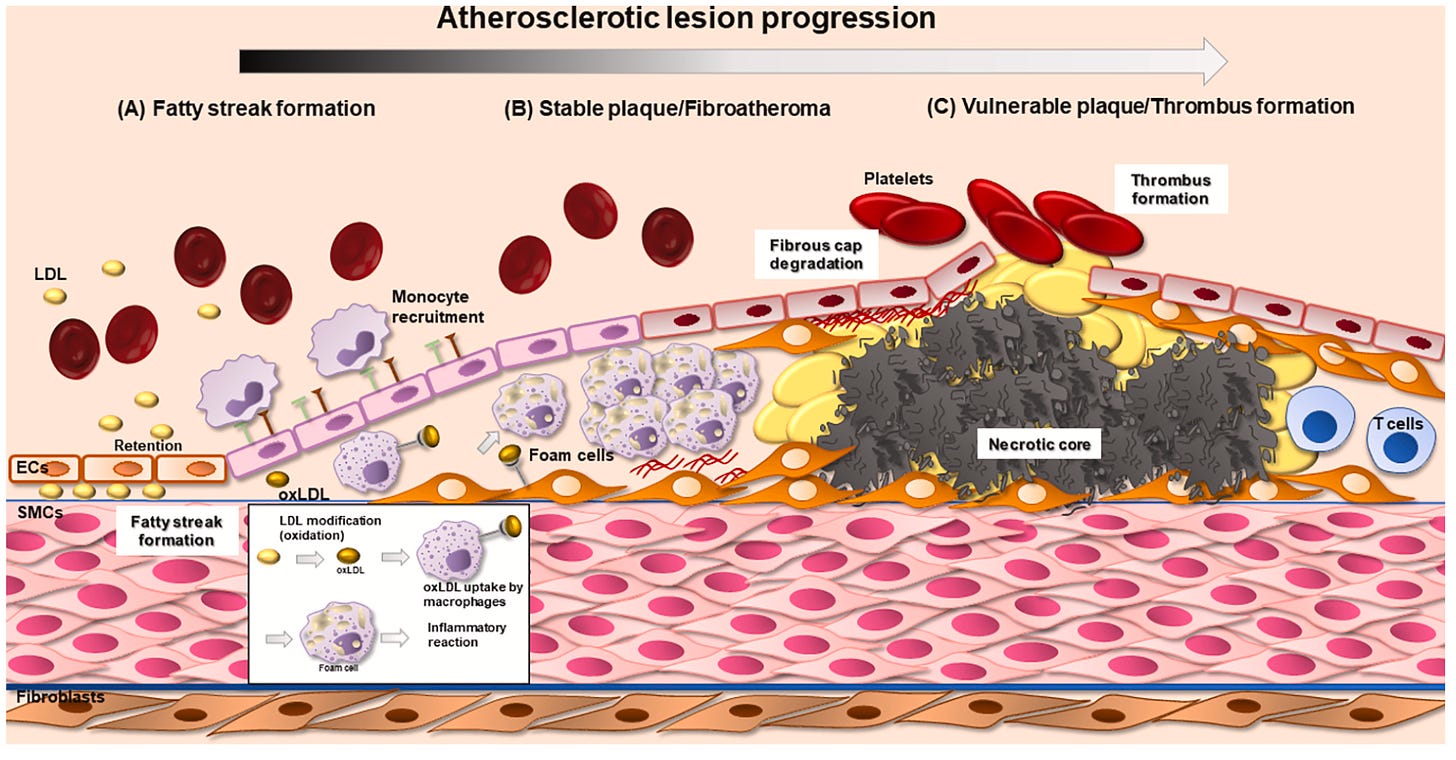Update On Cholesterol Lowering Tools

When people say ‘Heart Disease’ what they usually mean is coronary atherosclerosis. I.e. plaque in the arterial wall.
Although there are many risk factors for developing coronary atherosclerosis, a necessary precondition of having atherosclerosis is that a cholesterol particle crosses the wall of the artery, is trapped and sets off an inflammatory process1.
The coronary atherosclerotic plaque process has begun.

Other factors, such as smoking, diabetes, physical inactivity, high blood pressure, insulin resistance etc., all accelerate this process.
However, without a cholesterol particle to cross the arterial wall to commence this process, atherosclerosis would not be an issue.
This is why cholesterol lowering is a cornerstone in the approach to reducing the risks of coronary artery disease, most notably heart attacks.
We currently have tools to lower cholesterol levels by over 85%, and this is something I have discussed previously.
But even since then, the field has changed, and I wanted to provide an update on some of these changes.
PCSK9 Inhibitors
A huge step forward in the treatment of those with genetic cholesterol disorders and advanced atherosclerosis was the development of the injectable cholesterol-lowering therapy, PCSK9 inhibitors.
These therapies can lower cholesterol levels by up to 60% when used in isolation or 85% when used in combination with other oral cholesterol-lowering medications2.
One of the challenges, however, was the fact that these therapies involved a subcutaneous injection.
We may now have an oral version.
Recent data on an oral PCSK9 inhibitor has shown very promising results with similar cholesterol-lowering potential as the injectable version3.
This is a big step forward, and hopefully, in the near future, we will have such therapies available for clinical use.

Bempedoic Acid
To date, if a patient was not at their cholesterol target with the use of statin and/or ezetimibe therapy, the next step was the use of an injectable PCSK9 inhibitor.
While PCSK9 inhibitors are incredibly effective at lowering cholesterol levels, as already described, access to them from a reimbursement perspective has been a challenge worldwide.
Additionally, some patients develop side effects from statin therapy and, as a result, are unable to get to their target cholesterol level.
Bempedoic Acid is an oral cholesterol-lowering medication that acts on similar pathways to statin therapy but without many of the side effects.
Previous trials have shown it to effectively reduce cholesterol levels by about 15%4.
The outstanding question, however, was whether this reduction would translate into fewer heart attacks and strokes etc., and the answer to that question is yes.
Recent data have demonstrated that the use of Bempedoic Acid in those who are intolerant to statin therapy reduced the number of heart attacks and other vascular events by about 15%5.
This magnitude of reduction is similar to what we have seen with the use of Ezetimibe, another non-statin oral cholesterol-lowering medication6.
The addition of bempedoic acid to the arsenal of therapies we have available is a welcome development.

As of today, there is a range of therapies available to lower cholesterol by well over 85% and, by extension, massively reduce cardiovascular risk7.
There really is no reason why someone with residual cardiovascular risk as a consequence of excess cholesterol particles cannot achieve their target LDL cholesterol.
These are only two of the recent advancements, amongst many others.
We have the tools.
Now we just need to use them.
Extracellular vesicle signalling in atherosclerosis. Cell Signal. 2020 Nov;75:109751.
2022: The Year in Cardiovascular Disease – The Year of Upfront Lipid Lowering Combination Therapy. Archives of Medical Science. 2022;18(6).
Efficacy and safety of the oral PCSK9 inhibitor MK-0616: a phase 2b randomized controlled trial. J Am Coll Cardiol. Mar 06, 2023
N Engl J Med 2019;380:1022-32.DOI: 10.1056/NEJMoa1803917
Bempedoic Acid and Cardiovascular Outcomes in Statin-Intolerant Patients. NEJM March 2023
Ezetimibe Added to Statin Therapy after Acute Coronary Syndromes. N Engl J Med 2015; 372:2387-2397
Multinational Cardiovascular Risk Consortium. Application of non-HDL cholesterol for population-based cardiovascular risk stratification: results from the Multinational Cardiovascular Risk Consortium. Lancet. 2019 Dec 14;394(10215):2173-2183.




